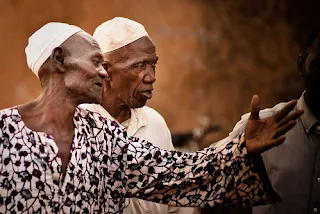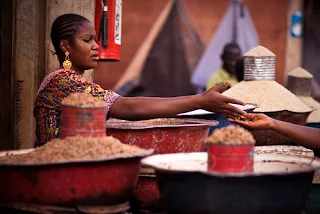The Mighty Moro Naba: Burkina Faso's Supreme Leader
Mossi rulers, known as Moro Naba in the Moré language, were called King of the World and defended Mossi's traditional religious beliefs and way of life.
Until the late 19th century, Burkina Faso's history was shaped by the Mossi, much like how the Mossi people, for many centuries, mirrored the American minutemen as both farmers and soldiers. The Mossi were expert empire builders, leaving an indelible mark on the region's history. Like minutemen in the United States, their legacy showcases their dual role as hardworking agriculturalists and skilled warriors who significantly influenced Burkina Faso's history.
The Mossi empire was a dominant force in the region, and understanding its history helps us comprehend the Moro Naba's historical significance. As the rulers of the Mossi empire, the Moro Naba held substantial power over this influential realm. The empire's success, akin to the Mossi people's dual farming and warrior roles, underscores the Moro Naba's importance. Local chiefs and traditional leaders, known as Naba, continue to hold authority in many Mossi communities.
The Mossi people have a history of strong traditional rulers.
The Mossi Empire consisted of several kingdoms, each with its own ruler. The most prominent of these kingdoms included the Yatenga Kingdom, the Ouagadougou Kingdom, the Tenkodogo Kingdom, and the Fada N'Gourma Kingdom.
The Mossi rulers were known as Moro Naba in the Moré Mossi language, which translates to King of the World. These rulers held significant authority and played essential roles in the governance and administration of their respective Mossi kingdoms. They were not just political leaders but also spiritual figures connected to the ancestral spirits.
Each Mossi kingdom had its Moro Naba, and they often engaged in diplomacy, warfare, and alliances with neighboring kingdoms and colonial powers during the colonial period. The Mossi rulers played a vital role in maintaining the stability and cultural identity of the Mossi people in Burkina Faso.
A majority of Burkinabes adhere to traditional African religions. The introduction of Islam to Burkina Faso was resisted by the Mossi rulers. The Mossi people could defend their religious beliefs and social structure against forcible attempts to convert them to Islam by Muslims from the northwest.
The Mossi practiced traditional African religions that were deeply ingrained in their culture. These belief systems often centered around the veneration of ancestral spirits, nature, and local deities. These religious practices were integral to the Mossi way of life, influencing their rituals, ceremonies, and daily activities.
Ultimately, the French colonial presence in the late 19th century profoundly impacted the region, including the Mossi territories. The capture of Ouagadougou by the French in 1896 marked the end of the Mossi resistance and the beginning of colonial rule. This period brought significant changes to the region, including introducing Christianity and Islam and shifting governance and administration.
Mossi Communities in contemporary times.
The Mossi people form one of the largest ethnic groups in Burkina Faso, making up a significant portion of the country's population. While their heartland lies in the central region of Burkina Faso, Mossi communities can also be found in neighboring countries like Ghana, Ivory Coast, Mali, and Togo.
Mossi society retains elements of its historical social structure. Local chiefs and traditional leaders, known as Naba, continue to hold authority in many Mossi communities. These leaders play essential roles in conflict resolution, community governance, and the preservation of cultural traditions.
The Mossi people predominantly communicate in the Moore language, which is commonly referred to as Moré. Moré holds a significant linguistic and cultural position as it is recognized as one of Burkina Faso's official languages, alongside French. This recognition underscores the importance of Moré in the nation's linguistic landscape, reflecting its historical and contemporary relevance in Mossi society.
As one of the official languages, Moré plays a crucial role in education, administration, media, and everyday communication, contributing to the preservation and promotion of Mossi cultural identity within the broader context of Burkina Faso's multicultural society.




